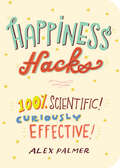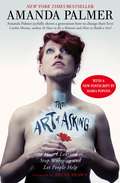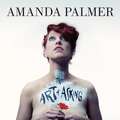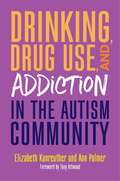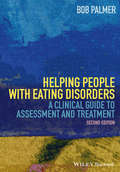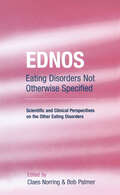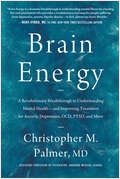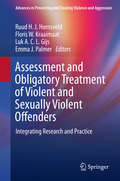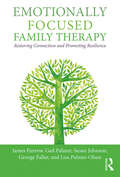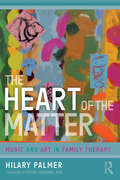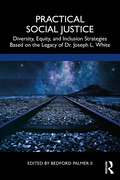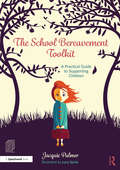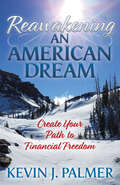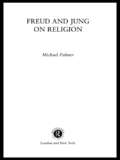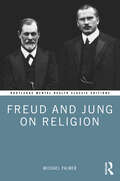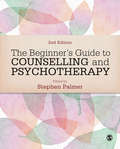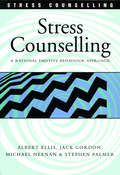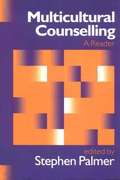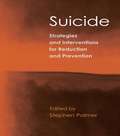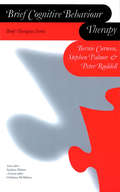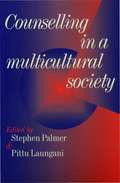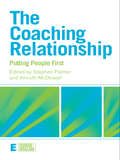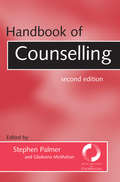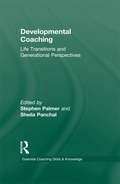- Table View
- List View
Happiness Hacks: 100% Scientific! Curiously Effective!
by Alex PalmerHighly Effective Hacks From Totally True Facts! Could you be happier at work . . . in love . . . in life? You may not need a total overhaul—just a few good Happiness Hacks! Here are hundreds of shortcuts to brighten your day and boost your mood—and the science behind how they work. Discover why . . . 57°F (13.9°C) is the happiest temperature Selfies give you a jolt of joy Renters have a surprising edge over homeowners 17-minute breaks are the most productive Intimacy is better than sex It’s more satisfying to work a full 40-hour week Date night is the key to a happy marriage Just 10 minutes of exercise can cheer you up! Whether you’re seeking better health, stronger friendships, or that elusive “happy place,” these stunningly simple tips are proven to help. You can hack your way to happiness!
The Art of Asking: How I learned to stop worrying and let people help
by Amanda PalmerREDISCOVER THE FORGOTTEN ART OF ASKING IN THIS NEW YORK TIMES BESTSELLING BOOK 'Amanda Palmer joyfully shows a generation how to change their lives' Caitlin Moran'To read Amanda Palmer's remarkable memoir about asking and giving is to tumble headlong into her world' Elizabeth Gilbert'The Art of Asking is a book about cultivating trust and getting as close as possible to love, vulnerability, and connection. Uncomfortably close. Dangerously close. Beautifully close' Brene BrownImagine standing on a box in the middle of a busy city, dressed as a white-faced bride, and silently using your eyes to ask people for money. Or touring Europe in a punk cabaret band, and finding a place to sleep each night by reaching out to strangers on Twitter. For Amanda Palmer, actions like these have gone beyond satisfying her basic needs for food and shelter - they've taught her how to turn strangers into friends, build communities, and discover her own giving impulses. And because she had learned how to ask, she was able to go to the world to ask for the money to make a new album and tour with it, and to raise over a million dollars in a month.In the New York TImes bestseller The Art of Asking, Palmer expands upon her popular TED talk to reveal how ordinary people, those of us without thousands of Twitter followers and adoring fans, can use these same principles in our own lives.
The Art of Asking: How I learned to stop worrying and let people help
by Amanda Palmer'When we really see each other, we want to help each other' - Amanda PalmerImagine standing on a box in the middle of a busy city, dressed as a white-faced bride, and silently using your eyes to ask people for money. Or touring Europe in a punk cabaret band, and finding a place to sleep each night by reaching out to strangers on Twitter. For Amanda Palmer, actions like these have gone beyond satisfying her basic needs for food and shelter - they've taught her how to turn strangers into friends, build communities, and discover her own giving impulses. And because she had learned how to ask, she was able to go to the world to ask for the money to make a new album and tour with it, and to raise over a million dollars in a month.In The Art of Asking, Palmer expands upon her popular TED talk to reveal how ordinary people, those of us without thousands of Twitter followers and adoring fans, can use these same principles in our own lives.
Drinking, Drug Use, and Addiction in the Autism Community
by Ann Palmer Elizabeth Kunreuther Tony AttwoodWhat is the connection between autism and addiction? Why are individuals with autism more likely to develop a substance use disorder than the general population? Until recently, substance use disorder (SUD) was considered rare among those with autism spectrum disorder (ASD). This book brings together current research and personal accounts from individuals with autism and their supports. It explores why addiction is more common among individuals with ASD and investigates how addiction and autism affect one another. The authors also provide strategies for supporting people with both ASD and SUD.
Helping People with Eating Disorders
by Bob PalmerUp-to-date and accessible, the second edition of Helping People with Eating Disorders is a comprehensive guide to understanding, assessing, and treating eating disorders. Focuses on evidence-based practice with references to the latest research and new DSM-V classifications Discusses the types of eating disorders and their causes, reviews treatment methods and their outcomes, and provides guidance on dealing with challenging cases Illustrates concepts and methods using several case studies that run throughout the book, as well as many examples from the author's clinical work Written in clear and concise language by an expert with over 40 years' experience in the field
EDNOS: Scientific and Clinical Perspectives on the Other Eating Disorders
by Bob Palmer Claes NorringEating Disorders Not Otherwise Specified covers all eating disorders that do not fall into either of the two main diagnostic groups: anorexia nervosa and bulimia nervosa. Although these less well known conditions are common and can be very severe, they are often neglected. This book brings together contributions from many of the leading researchers and practitioners in the field of eating disorders and presents the topic of EDNOS from a range of perspectives including the clinical, the epidemiological, the nosological, the biological and the trans-cultural. This comprehensive summary of the subject of EDNOS demonstrates that by investigating the nature, cause and treatment of these disorders, we can throw light on the classification and nature of eating disorders as a whole. It will be of great interest to all professionals in the field of eating disorders.
Brain Energy: A Revolutionary Breakthrough in Understanding Mental Health--and Improving Treatment for Anxiety, Depression, OCD, PTSD, and More
by Christopher M. PalmerThis is the book that will forever change the way we understand and treat mental health. If you or someone you love is affected by mental illness, it might change your life.We are in the midst of a global mental health crisis, and mental illnesses are on the rise. But what causes mental illness? And why are mental health problems so hard to treat? Drawing on decades of research, Harvard psychiatrist Dr. Chris Palmer outlines a revolutionary new understanding that for the first time unites our existing knowledge about mental illness within a single framework: Mental disorders are metabolic disorders of the brain. Brain Energy explains this new understanding of mental illness in detail, from symptoms and risk factors to what is happening in brain cells. Palmer also sheds light on the new treatment pathways this theory opens up—which apply to all mental disorders, including anxiety, depression, ADHD, alcoholism, eating disorders, bipolar disorder, autism, and even schizophrenia. Brain Energy pairs cutting-edge science with practical advice and strategies to help people reclaim their mental health. This groundbreaking book reveals: Why classifying mental disorders as &“separate&” conditions is misleadingThe clear connections between mental illness and disorders linked to metabolism, including diabetes, heart attacks, strokes, pain disorders, obesity, Alzheimer&’s disease, and epilepsyThe link between metabolism and every factor known to play a role in mental health, including genetics, inflammation, hormones, neurotransmitters, sleep, stress, and traumaThe evidence that current mental health treatments, including both medications and therapies, likely work by affecting metabolismNew treatments available today that readers can use to promote long-term healing Palmer puts together the pieces of the mental illness puzzle to provide answers and offer hope. Brain Energy will transform the field of mental health, and the lives of countless people around the world.
Assessment and Obligatory Treatment of Violent and Sexually Violent Offenders: Integrating Research and Practice (Advances in Preventing and Treating Violence and Aggression)
by Emma J. Palmer Ruud H. J. Hornsveld Floris W. Kraaimaat Luk A. C. L. GijsThis book examines the assessment and obligatory treatment programs for violent and sexually violent offenders – primarily adolescents and adults – diagnosed with cluster B personality disorder or a conduct disorder. It describes concepts, theories, and legal aspects as well as the psychological and neurobiological characteristics of violent and sexually violent offenders and forensic psychiatric patients. Chapters review treatment programs and provide guidelines for gathering additional information and formulating functional analyses to establish individual treatment plans. In addition, chapters offer treatment modules for violent offenders and sexually violent offenders and address specific problems that may be encountered in practice and how to overcome these problems. The book concludes with the editors’ recommendations for future research in offender assessment and rehabilitation.Topics featured in this book include:Heuristic models of aggressive and sexually aggressive behavior.The use of self-reporting questionnaires in offender populations.Reliable assessment instruments.The effectiveness of existing rehabilitation programs. Cognitive-behavioral treatment modules for violent and sexually violent offenders.Self-regulation and self-management skills to be used in rehabilitation programs.Facilitating treatment integrity in penitentiary and forensic psychiatric institutions.Assessment and Obligatory Treatment of Violent and Sexually Violent Offenders is an essential resource for researchers, clinicians/therapists, and upper-level undergraduate and graduate students in forensic psychology, public health, criminology/criminal justice, and behavioral therapy and rehabilitation.
Emotionally Focused Family Therapy: Restoring Connection and Promoting Resilience (The Guilford Family Therapy Series)
by Gail Palmer George Faller Lisa Palmer-Olsen Susan Johnson James FurrowEmotionally Focused Family Therapy is the definitive manual for applying the effectiveness of emotionally focused therapy (EFT) to the complexities of family life. The book sets out a theoretical framework for mental health professionals to enhance their conceptualization of family dynamics, considering a broad range of presenting problems and family groups. The first section applies EFT theory and principles to the practice of family therapy. The second section explicates the process of EFT and examines the interventions associated with the EFT approach to families. In the final section, the authors provide case examples of emotionally focused family therapy (EFFT) practice, with chapters on traumatic loss, stepfamilies, externalizing disorders, and internalizing disorders. Integrating up-to-date research with clinical transcripts and case examples throughout, Emotionally Focused Family Therapy is a must-read for therapists looking to promote the development and renewal of family relationships using the principles of EFT.
The Heart of the Matter: Music and Art in Family Therapy
by Hilary PalmerThe Heart of the Matter invites therapists from all disciplines to consider the use of music and art in their work with families. It introduces systemic music and art ideas, giving clinical examples from practice, and a rationale for using each technique. Conversations with therapists who have explored and incorporated the techniques into their work are shared, and include both personal and professional responses to incorporating new methods in practice. Through a back drop of exploration into what creativity is, the history of the arts in therapy, and consideration of what happens when we use words, the case for music and art to be part of practice with families is presented. This book is more than a handbook of techniques; it explores who we are as therapists, our challenges and our resourcefulness, as we operate in multiple systems to bring about positive change.
Practical Social Justice: Diversity, Equity, and Inclusion Strategies Based on the Legacy of Dr. Joseph L. White
by Bedford Palmer IIPractical Social Justice brings together the mentorship experiences of a diverse group of leaders across business, academia, and the public sector. They relay the lessons they learned from Dr. Joseph L. White through personal narratives, providing a critical analysis of their experience, and share their best practices and recommendations for those who want to truly live up to their potential as leaders and mentors. As one of the founding members of the Association of Black Psychologists, the Equal Opportunity Program, and the ‘Freedom Train’ this book focuses on celebrating Dr. White’s legacy, and translating real world experience in promoting social justice change. Experiential narratives from contributors offer a framework for both the mentee and the mentor, and readers will learn how to develop people and infrastructure strategically to build a sustainable legacy of social justice change. They will be presented with ways to pragmatically focus social justice efforts, favoring results over ego. This is a unique and highly accessible book that will be useful across disciplines and generations, in which the authors illustrate how to build relationships, inspire buy-in, and develop mutually beneficial partnerships that move people and systems towards a more equitable, inclusive, and just future. Providing a personal guide to developing an infrastructure for institutional change, Practical Social Justice is based on over half a century of triumph, translated through the lenses of leaders who have used these lessons to measurable and repeatable success. This book will be essential reading for undergraduate and graduate students in the fields of Psychology, Social Work, Ethnic Studies, Sociology, Public Policy, Leadership, Communications, Business, and Educational Administration. It is also important reading for professionals including leaders and policy makers in organisations dealing with issues around diversity, equity, and inclusion, and anyone interested in promoting social justice.
The School Bereavement Toolkit: A Practical Guide to Supporting Children
by Jacquie PalmerPractical and accessible, this guidebook is designed to help staff in schools support bereaved children in their care. Providing information and guidance on practical issues around bereavement and indicating some of the issues that might require extra thought or assistance, this book makes accessing relevant information as easy and quick as possible.When busy school staff are faced with a bereaved child, the prospect can be daunting. What do I say? What can I do? Will I make it worse? Have I got time to do this? This book is a toolbox to give staff confidence in helping bereaved young people. Information is easily accessed and simple to use, giving staff quick and practical help. There are sections on what will help and what will not; also included are photocopiable worksheets and tools to aid children and young people to explore their grief, as well as information on how school communities can share the news and manage an initial response.With age-appropriate guidance to help school staff working in both primary and secondary settings, this key guide provides quick-to-access information for those not trained in child bereavement to help individual children or whole classes following a loss.
Reawakening an American Dream: Creating Your Path to Financial Freedom
by Kevin J PalmerReawakening an American Dream reveals the hidden secrets first-time millionaires have used to gain abundance or achieve financial freedom.
Freud and Jung on Religion
by Michael PalmerMichael Palmer provides a detailed account of the theories of religion of both Freud and Jung and sets them side by side for the first timeIn the first section of the text Dr Palmer analyses Freud's claim that religion is an obsessional neurosis - a psychological illness fuelled by sexual repression. The second section considers Jung's rejection of Freud's theory and his own assertion that it is the absence of religion, not its presence, which leads to neurosis.Freud and Jung on Religion is suitable for general and specialist reader alike, as it assumes no prior knowledge of the theories of Freud or Jung and is an invaluable teaching text.
Freud and Jung on Religion (Routledge Mental Health Classic Editions)
by Michael PalmerIn this outstanding book, originally published in 1997, and subsequently translated into many languages, Michael Palmer presents a detailed and comparative study of the two most famous theories of religion in the history of psychology: those of Freud and Jung. The first part of the book analyses Freud's claim that religion is an obsessional neurosis—a psychological illness fueled by sexual repression—and the second part considers Jung's rejection of Freud's theory and his own assertion that it is the absence of religion, not its presence, which leads to neurosis. Originally given as a series of lectures at Bristol University, this Classic edition of Freud and Jung on Religion is important reading for general and specialist readers alike, as it assumes no prior knowledge of the theories of Freud or Jung and is an invaluable teaching text.
The Beginner's Guide to Counselling & Psychotherapy
by Professor Stephen PalmerAre you interested in the field of counselling and psychotherapy or just starting out in your training? Trying to get to grips with the many different approaches and decide which are right for you? This book can help! An ideal introductory text that assumes no prior knowledge, leading authors in the field provide overviews of 26 counselling and psychotherapy approaches in accessible, jargon-free terms. Each approach is discussed using the same framework to enable easy comparison and evaluation, covering: · Development of the Therapy · Theory and Basic Concepts · Practice · Which Clients Benefit Most? · Case study Four further chapters offer an insight into the therapeutic relationship, working with diversity, professional issues, and research, while resources such as suggested reading, discussion issues, appendices of further information and a comprehensive glossary help you consolidate your learning. So look no further if you want to know the differences between counselling and psychotherapy, compare psychodynamic and psychoanalytic theories, discover how constructivist approaches can be applied in practice, learn about third wave CBT therapies, or just get an general overview of the field; this second edition of a bestseller gives you a whirlwind tour of the breadth, complexity, fascination and problems of the field of counselling and psychotherapy.
Stress Counselling: A Rational Emotive Behaviour Approach (Stress Counselling #11)
by Professor Stephen Palmer Mr Michael Neenan Dr Albert Ellis Mr Jack Gordon`The text is clear and easy to follow with vivid sessional excerpts that illustrate the theoretical dialogue' - International Review of Psychiatry `The publication proves to contain much instructive and practice-oriented material' - Nursing Standard Stress Counselling is a comprehensive study of the theory and practice of the Rational Emotive Behaviour approach applied to stress counselling and psychotherapy. Albert Ellis pioneered Rational Emotive Behaviour Therapy (REBT), which has since been adopted internationally. This approach enables the clients to embark on a course of effective counselling which has a clear beginning and end. This book discusses techniques and solutions to common problems and also provides guidance on conducting group work. Its comprehensive coverage includes additional material on techniques such as skills training, relaxation methods, hypnosis and biofeedback.
The Beginner's Guide to Counselling & Psychotherapy
by Stephen PalmerAre you interested in the field of counselling and psychotherapy or just starting out in your training? Trying to get to grips with the many different approaches and decide which are right for you? This book can help! An ideal introductory text that assumes no prior knowledge, leading authors in the field provide overviews of 26 counselling and psychotherapy approaches in accessible, jargon-free terms. Each approach is discussed using the same framework to enable easy comparison and evaluation, covering: · Development of the Therapy · Theory and Basic Concepts · Practice · Which Clients Benefit Most? · Case study Four further chapters offer an insight into the therapeutic relationship, working with diversity, professional issues, and research, while resources such as suggested reading, discussion issues, appendices of further information and a comprehensive glossary help you consolidate your learning. So look no further if you want to know the differences between counselling and psychotherapy, compare psychodynamic and psychoanalytic theories, discover how constructivist approaches can be applied in practice, learn about third wave CBT therapies, or just get an general overview of the field; this second edition of a bestseller gives you a whirlwind tour of the breadth, complexity, fascination and problems of the field of counselling and psychotherapy.
Multicultural Counselling: A Reader
by Stephen Palmer`The book contains comprehensive coverage of issues relating to multicultural counselling, still current ten years after the first of the collected papers was published. The discussion points after each chapter give the whole book a text-book feel, which belies its more general significance as a professional 'Raising cultural awareness and challenging assumptions, this book will be essential reading' - Stress News Race is a complex and sensitive subject which has a direct and significant bearing on counselling. Multicultural Counselling provides insights and provokes debate about the impact of race and ethnicity on counsellors, their clients and the therapeutic process. Edited by Stephen Palmer, this collection of 20 articles represents the multiplicity of issues raised by counselling in a multicultural society. It examines topics which affect all counsellors, including the dynamics of mixed and same race counselling relationships and the dilemmas which confront counsellors in how to address issues related to racism which are raised in counselling. The book covers both theory and practice, outlining different approaches to multicultural and transcultural counselling, highlighting the racism implicit in some counselling theory and providing examples of multicultural counselling practice. The Reader also presents fresh perspectives on counselling from beyond the predominantly white, Western culture in which it evolved and discussion issues at the end of each chapter further encourage the reader to take a critical and questioning approach to the subject. Multicultural Counselling brings to the fore the key issues involved in multicultural counselling and captures the full complexity of the subject. Essential reading for trainee and practising counsellors, psychotherapists, counselling psychologists and others involved in therapeutic relationships with clients, the book aims to raise cultural awareness and challenge assumptions.
Suicide: Strategies and Interventions for Reduction and Prevention
by Stephen PalmerAll practitioners working in the caring and helping professions face many challenges and questions when dealing with suicidal clients: Is this client being serious? Can I do more? What should I do? Should I refer on? Should I break confidentiality? Have I assessed this client correctly? Both experienced practitioners and trainees wish to have more knowledge about assessing and dealing with suicidal clients. Suicide: Strategies and Interventions for Reduction and Prevention examines myths about suicide, explores facts and statistics at national and international levels, and uses client cases to uncover thoughts leading to suicidal behaviour. The editor offers an insight into what can be done in the community, and within therapeutic settings when working with this challenging client group. Contributions are divided into four parts, covering: suicide: statistics, research, theory and interventions personal experience of suicide three therapeutic approaches to prevent suicide group interventions. Featuring chapters from a range of experienced practitioners, this book provides a wealth of information on strategies and possible interventions. The addition of a self-harm management plan, assessment checklists, and list of useful organizations makes it essential reading for both mental health professionals, and those in training.
Brief Cognitive Behaviour Therapy (Brief Therapies series)
by Stephen Palmer Berni Curwen Peter Ruddell`[This] will be a useful resource for anyone who is interested in learning more about Cognitive Behaviour Therapy' - Behavioural & Cognitive Psychotherapy This practical guide, based on the theory that emotional disorders are influenced by negatively biased thinking, describes how brief cognitive behaviour therapy can provide effective help to clients suffering from a wide range of disorders, including anxiety, depression, obsessive-compulsive disorder and post-traumatic stress, or those who are suicidal. Using illustrative case material throughout, the authors outline strategies for helping clients examine and overcome unhelpful beliefs and patterns of thought at the root of their distress. Following an explanation of brief therapy and the theory behind cognitive-behaviour therapy, they describe the process of working with clients through all stages of counselling.
Counselling in a Multicultural Society (Multicultural Counselling Ser.)
by Stephen Palmer Pittu Laungani`The book aptly describes, explores and hits the core of very complex issues around race, racism, culture, difference, dual identity, stereotypes, immigration and alienation. . . It is also very thought-provoking, raising questions about one's own ability to work more flexibly in the consulting room with clients of different backgrounds. . . It is excellent for a directory of resources, useful for training purposes and an enabling "role model" for good practice in counselling in a multicultural society. I enjoyed it. . . It should be a required handbook on the shelf of every caring professional working within a multicultural environment or setting' - Transformations, The PCSR Journal This book examines the many comp
The Coaching Relationship: Putting People First (Essential Coaching Skills and Knowledge)
by Stephen Palmer Almuth McDowallThe Coaching Relationship discusses how we can integrate process perspectives such as the quality of the coach-coachee relationship, and professional perspectives including the influences of training and supervision, for more effective outcomes. Stephen Palmer and Almuth McDowall bring together experts from the field of coaching to discuss different aspects of the coach-coachee relationship, topics covered include: the interpersonal perspective the role of assessment ethical issues cultural influences issues of power. The book also includes a chapter on the interpersonal relationship in the training and supervision of coaches to provide a complete overview of how the coaching relationship can contribute to successful coaching Illustrated throughout with case studies and client dialogue, The Coaching Relationship is essential reading for practicing coaches and coaching psychologists wishing to learn more about the interpersonal aspects of coaching.
Handbook of Counselling
by Stephen Palmer Gladeana McMahonThe Handbook of Counselling provides a comprehensive and up-to-the-minute guide for counsellors and those using counselling skills in other professions. The contributors, all experienced practitioners, explore the major arenas and settings in which counselling is practised as well as the key themes and issues faced by those working in this field.This edition of the handbook has been thoroughly revised and updated to reflect the pace of growth and change within counselling over recent years. Six new chapters have been added, covering:* brief and time-limited counselling* working with adults abused as children* trauma and post-traumatic stress disorder* counsellor-client exploitation* private practice* counselling in voluntary settings.Published in association with the British Association for Counselling, the Handbook of Counselling provides a definitive source of information and guidance for counsellors both in training and practice.
Developmental Coaching: Life Transitions and Generational Perspectives (Essential Coaching Skills and Knowledge)
by Stephen Palmer Sheila PanchalDevelopmental Coaching explores many of the common transition points we experience throughout life, including teenage transitions, becoming a parent, mid-life and retirement. The book sets these transitions in their social context and reviews them in the light of generational factors. The book is introduced with key psychological concepts from areas such as lifespan development and positive psychology, in addition to insights from other disciplines, including management theory and sociology. The main topics of discussion are: coaching tools and techniques broader societal and generational trends how coaching can help individuals to realise positive growth. With case studies throughout, Developmental Coaching offers an essential resource for practising coaches, coaching psychologists, counsellors and other professionals who wish to further their knowledge of the developmental aspects of coaching and dealing with life transitions.
